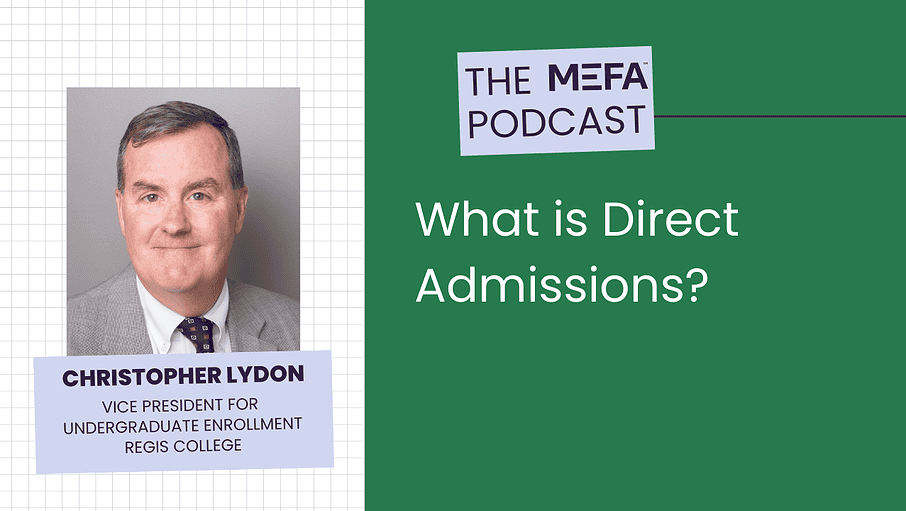

Resources Mentioned in this Episode
Please note that this transcript was auto-generated. We apologize for any minor errors in spelling or grammar.
Christopher Lydon: [00:00:00] Direct admission is an opportunity for colleges to identify students who have the academic qualifications that are appropriate for their school and their programs, and in essence say ahead of time, you fit our criteria. Would you like to consider us? So in essence, for a first generation student, for a student who’s perhaps self-esteem around their high school records suggests maybe they don’t think there’s a college for them.
Hearing from colleges that we want to is a very different, I think, approach than simply general emails that colleges send, come visit, come apply. This is saying, we are already validating you’re a fit for us academically. We’d like you to learn more about us.
Jonathan Hughes: Hello everyone and welcome to The MEFA Podcast. My name is Jonathan Hughes. [00:01:00] That was a snippet of the interview that we recorded for this show today and we talked about directed missions. What is that? It’s something that came to our attention about a year or two ago. We started getting calls from students saying that they had received letters from a particular college.
Looking as though they had already been admitted without having applied. And so in recent years, more colleges have adopted this practice of direct admissions, which is essentially taking a more proactive approach to court students. Now, what does this mean for students? How do colleges identify these students?
What’s the process like from there? Is there a catch? We’re going to talk about all of this with our guest on the show today, who is a representative from a college. Who practices direct admission, so we’ll learn all about it and how he feels that this can benefit both colleges and students to find a good fit.
So I’ll be back with the wrap up. But for now, let’s get to [00:02:00] it and let our guest introduce himself.
Christopher Lydon: My name is Chris Lydon. I’m the Vice President for Undergraduate Enrollment at Regis College in Weston, Massachusetts. I’ve been there here about six months, so it’s a new place for me. Though I’ve been in higher education for a little over 40 years.
My entire career has been in Catholic higher education starting at my alma mater, Providence College. I graduated, spent the first five years in the admission office there and the career took off from there. Found it was the right fit for me professionally. I’ve had an opportunity to be in leadership positions at a variety of places.
I returned to Providence eventually as the Associate VP and Dean of Admission where I was there for over 14 years. And then was able to move into vice presidential positions at Stonehill, the Catholic University of America, and now I’ve returned to my home base in New England and have come back to Regis College.
Get to stay in Catholic higher education, get to live in my house in Rhode Island and carry on my career done admission work all these years. I’ve always still had a recruitment territory. [00:03:00] I’m still an admission counselor and we’ll service applicants as a first reader, as a high school visitor and things like that, which is frankly the best part of the job.
And over time got very involved in work with financial aid offices. And so for over 30 years, had direct responsibility for financial aid, as well as admission and did student student accounts and billing. I did graduate admission at different places, but my heart is an undergraduate enrollment.
So Regis is a great fit for me and it serves a great purpose. I’m really thrilled to be part of their community.
Jonathan Hughes: Congratulations on the new job. I didn’t realize you were quite so new back at Regis.
Christopher Lydon: You can be old and you can be a rookie at the same time. So that’s me, I think.
Jonathan Hughes: Yeah, me too. And I’ve been at the same job for many years, but I feel like a rookie for sure. We’re here to talk today about direct admission. Can you just tell folks exactly what direct admission is and how does a perspective student, experience that?
Christopher Lydon: Sure. Sure. So direct admission. Some may have heard it called [00:04:00] reverse or flipped admission. It’s basically turning the process around. If you think about traditional admission, students submit an application. Submit their essay recommendations, transcripts, of course, and after a certain amount of time, they get a letter or a portal and an invite to check and see their decision and see if they’ve been admitted to an institution.
Direct admission is an opportunity for colleges to identify students who have the academic qualifications that are appropriate for their school and their programs, and in essence, say ahead of time, you fit our criteria. Would you like to consider us? In essence, for a first generation student, for a student who’s perhaps self esteem around their high school records suggests maybe they don’t think there’s a college for them, hearing from colleges that we want you is a very different, I think, approach than simply general emails that colleges send, come visit, come apply.
This is saying we’re already validating you’re a fit [00:05:00] for us academically. We’d like you to learn more about us. So to a degree, I think it’s a confidence builder particularly for students who may wonder whether there’s a college for them. There’s so much to demystify about the college admission process and so much that seems scary and can be a barrier.
And if you’re, if your parents haven’t gone to college if you’re at a school with a 300 to one counselor to student ratio, how do you know, how do you get the affirmation of what’s available to you? So I think Part of what’s behind the philosophy of direct admission is the opportunity for students to see colleges saying you can be a fit here in a very real way.
Jonathan Hughes: What does a student who gets a direct admissions letter saying that you could be a fit at Regis College, for example what do they need to do then?
Christopher Lydon: So it, so you know, like everything else in college admission, it depends it depends what kind of direct admission program they’re in. We are in three pilot programs this year.
The primary one is with the common [00:06:00] application. The Common App established a pilot program a couple of years ago. They expanded it and we joined in this year, which gives us access to students who have a Common App accounts. We have some information about them because they’re in The Common App.
We’re tied to Massachusetts only and it’s specifically for first gen students. So it’s again to serve a population for whom affirmation and eliminating barriers can help them with their college process as far as that’s concerned. So if. If we connect with a student through the Common App, basically their next step is to add us to their Common App lists.
And then because the Common App already exists, they just have to press the button and their application gets to us. So the Common App is our primary direct admission program. There are several others. They’re more driven by outside organizations. An organization called EAB has a platform called concourse niche dot com, which has a very large database of high school students searching for colleges, has a direct admission program.
There’s another direct admission program with an organization called college vine. [00:07:00] So these are all different types of organizations that have student data, and they’ve invited college universities to get access to that data for a fee, and to have the opportunity to identify criteria where then those organizations will push out to students, hey, school A, school B, says you meet their directed mission criteria, often including a baseline scholarship amount.
Same is true for the Common App. So not only do they hear that they’re admitted, but based on the criteria that an institution establishes, we might say, not only are you admissible to Regis College, but you fit a minimum scholarship category of 15, So we’re also trying to address immediately, and we’re going to help you pay for college.
So in all these different platforms it’s both The invitation to be admitted and it’s here’s a baseline scholarship amount that’s based on academic ability, not yet based on financial need as far as that’s concerned. If you’re a niche, if you’re in CollegeVine, if you’re on this [00:08:00] EAB concourse platform, you get an invitation to told that you’re, Regis College, and we’re not in all of these, but just as an example, Regis College it says you’re qualified for admission at a scholarship level of this.
If you’re interested, do this. And typically there’s a portal, there’s a form that the students complete. So we get their basic background information. And of course they do have to upload a transcript to verify that what we learned about them through a profile is backed up by their actual high school transcript.
So that basically is, it’s a streamlined process, certainly, but it’s not a blank check. There is a verification that what the student put it built in their profile that made us interested is backed up by a transcript that reflects the work we need to see to be successful in the program they want to study.
In my experience very limited experience, obviously, because we’re new into the pilot, students are pretty good about building their profiles. And we’re not seeing students come to us through direct [00:09:00] admission where. Nope. What we saw we’re, we have to say, sorry, it, it doesn’t actually work as far as that’s concerned.
Jonathan Hughes: How long has Regis been doing direct missions?
Christopher Lydon: So before my, before me, last year through that EAB concourse platform Regis did a small pilot. In the international market space trying to get some additional visibility in international spaces. So we did a pilot with them last year just on the international side.
We probably identified 40, no, probably not quite that many, 25 to 30 students who met criteria that was a fit for us of those seven or eight Raise their hand and completed the process. None of them ultimately chose us. Again, small pilot. Really, there’s no harm to us if, in terms of the opportunity to introduce ourselves, they weren’t going to enroll us if we didn’t have direct admission.
At least we got ourselves in their conversation. I think as far as that’s concerned and this year, this year will be, really the big test we’re now we’re in the concourse [00:10:00] global one concourse has a domestic one, which we went into as well we are doing a partnership with niche and then we have, and those are relatively small in total I think we barely made about a hundred offers of admission through those portals.
But the Common App one is a much larger one just because they have so many student records. And even though we’re limited to first gen students in Massachusetts, which actually is a niche that we serve really well already. We’ve seen, several hundred students. Come into the Regis applicant pool through the common app with that direct admission tag already in place.
And I think that one of the things we need to learn as we get a chance to assess this at the end of the cycle, some of those students had us on their list anyway, and so there’s a little bit of a chicken or the egg we’re going to have to learn about. Did they definitely apply to us because they heard they got the encouragement to direct admission, or were they going to apply to us anyway?
We’re going to have to [00:11:00] unwrap this at the end of the process, but obviously until students make their college decisions for this year, this is an open question until we see yield at the end of the enrollment process in this cycle.
Jonathan Hughes: This is the first year that you’re doing it. Do you think that whatever’s going on in financial aid, how are we going to categorize that? What impact do you think that’s had on this year? And then just some of the student reactions that you’ve received, what have some of the reactions been?
Christopher Lydon: Yeah. Yeah. I would say our early reaction is a little bit of surprise because this is still relatively new across the board and certainly students aren’t getting 10s and 10s of directed mission offers, regardless of platform.
So a little bit of surprise. And is it really that easy? And yes, as long as you. Send us a transcript, that kind of thing. And that’s about as much as we know at this stage, where we are right now, coming up on March 1, we’ve probably admitted 80 percent or so of the total number of students we’re going to admit for this year.
So we still have, we’re having it actually Pretty [00:12:00] good application year. We are still reading applications that have come into us organically from that perspective. And within the next 2 or 3 weeks, we’ll be at about the 96 97 percent of all the admits we’re going to have for this year.
And then, of course, yield season is fully underway. Typically leading to May one and students making their enrollment decisions, and that’s where you take the deep breath and you say, okay here we are in FAFSA world. And what does that really mean for this year? So first of all, I think that I mentioned the scholarship part for direct admission.
Certainly institutions who are doing this intend to provide these students with financial aid in the same fashion they would provide financial aid to any other event. They’re neither. They’re certainly not penalized, but I would also say in general, they’re not going to get more aid than they would if we’re not going to treat direct admission students better, certainly not going to treat them worse as far as that’s concerned, but to the extent that Regis has a need based financial aid budget, in addition to the merit scholarships, students who are admitted through direct admission are [00:13:00] going to get the financial aid that they’d be entitled to based on their eligibility when we actually start to see FAFSA data.
So yes, this is an interesting year to have this going on because there’s so much uncertainty around families getting to bottom line cost. And again, as we turn the corner to March 1, we know that we’re at least 2 weeks or so away. From the start of data flowing from the federal government to colleges, universities, and then we need time to actually assess that data.
Make sure our systems and our packaging is working properly. Students are definitely gonna be getting need based aid in a later time frame this year than in prior years. But our message to our admits is simply. Be sure to apply. You should not be delaying applying for financial aid because of what you’re hearing.
Get your application into the process so your colleges and universities can get it as soon as possible. And we’ve just simply said that, look, our funding is ready. There’s no deadlines this year for financial aid. [00:14:00] Apply as soon as you can. But when we get your information, we’re going to provide you with The right amount of financial aid based on your eligibility, not based on when we got your information.
There is no late penalty in financial aid world this year for us, and I’m sure that’s the case for most other institutions as well.
Jonathan Hughes: I have one more kind of wonky question before we move on, and that is. There are different timelines for applications of regular decision, that’s early action, early decision and whatnot. When do these notifications go out to the direct admitted students?
Christopher Lydon: It’s a rolling basis. So in the common app did two large chunks, around like the idea of early action and regular decision. So the first wave went out In I think it was right around November 1 that Common App made notifications to students with Common App accounts.
So in Massachusetts, I believe there are seven institutions that are in the pilot program in Massachusetts. Based on the criteria we set, in early November, students got notification that us, that Regis and perhaps some other schools, [00:15:00] We’re directed direct admitting them. And then the common app did a second batch in mid January or so.
So they followed more like that traditional early action, regular decision niche and E. A. B. concourse are both more of a rolling basis. So every, so they’re as students create profiles in those platforms, new students might meet the criteria all the time. And so we might get an E. A. B. concourse list once a month, yeah. We might get a niche list every week or every two weeks based on students who’ve entered that that platform. And of course like the traditional admission cycle itself. Fewer seniors are entering that platform now. Now they’re starting to get more sophomores and juniors starting their search and that process will start again in the fall as far as that’s concerned.
So it’s more of a rolling admission kind of thing. We got a roster from niche today that had a handful more students in it who are who are directed who were directed mid eligible as far as that’s concerned. But that volume is also trickling off because we’re now later in the senior year.
Jonathan Hughes: If you had a message [00:16:00] for a student who did receive a direct admission notice and they’re unsure of whether they want to proceed or not, maybe they’re a little skeptical because I don’t know if that’s ever a common reaction for students to have. What would you counsel that student to do or to keep in mind or where to go from there?
Christopher Lydon: It’s not a scam. And I think, in an electronic world, when an email comes, it sounds too good to believe you tend to believe it’s too good to believe, right? But direct admission is a real thing. And I think it will grow as some of these pilot programs, if institutions find value.
Then it’s going to grow, I think, as far as that’s concerned. First of all, if you see direct admission do not think it’s a game. It’s a real opportunity. And I think that, I think that’s the key word is opportunity. Because if you get an email from the Common App that says that Regis College is interested in you, and you’ve never paid attention to Regis, and you want to be a nurse, or you want to be in dental hygiene.
It’s worth your while to click and learn more. And it [00:17:00] certainly has the potential to be. The right academic fit because we’ve already pre screened you based on the criteria we set. So I think from a student perspective, the key word is opportunity. Learn if the school you haven’t heard of, it’s worth a couple of clicks to see if by location by size, by program. It’s a school that could be a fit for you. It’s going to be a relatively easy process to complete the steps to get that formal admission and get into this, get your formal scholarship mount. And of course, move into the need based part as well, as far as that’s concerned. Be inquisitive take advantage of these opportunities, colleges, universities, since the dawn of email, have search students in a traditional sort of, reaching out to sophomores, juniors and seniors.
Hey, learn about my school. That’s going to continue, but a direct admission offer is validating to the student and is it’s an already a pre fit sort of indication. That this college knows you’ve got [00:18:00] what you need. You’ve got the grades. You’ve got the background necessary to succeed in our program.
We invite you to learn more and that’s, I think, the most important component. And I would also say as well, and this is really important I don’t believe because I wouldn’t have, I wouldn’t have invested Regis’s time in this if I thought that we were In essence, watering down academic quality, where I started in terms of setting criteria.
This is not open enrollment. We’re not sending this blindly to just simply create interest that each school sets criteria that matches, comfortable admission policies in terms of GPA expectation, curriculum expectation as far as that’s concerned. And You also shouldn’t look down at a school that does this as, ah, they’re not selective.
Selective is a relative term. If we select the right criteria to reach out, then that idea of right fit student, academically prepared student, is the most important component and I don’t think it says something negative about an institution [00:19:00] that is looking for new ways to identify students who might not otherwise know about them.
Jonathan Hughes: No, I agree a hundred percent. And I wish you the best of luck and everything that you’re doing. And hopefully you’ll come back next year and talk to us about what a great success it’s been. I’d love to. Thank you so much, Chris. Thank you.
Christopher Lydon: Thanks for the time today. I appreciated the conversation.
Jonathan Hughes: All right. Thank you, Chris. I really enjoyed that. And folks, if you liked what you heard today and you want to know more from MEFA about planning, saving, and paying for college and career readiness then you can follow the show and you can find us wherever you get your podcasts. And please remember to review us.
It helps us to keep doing what we’re doing. Getting the show out to folks. I want to thank Shaun Connolly, our producer. I want to thank AJ Yee, Lauren Danz, and Lisa Rooney for their assistance in [00:20:00] posting the show. Once again, my name is Jonathan Hughes, and this has been The MEFA Podcast. Thanks.













